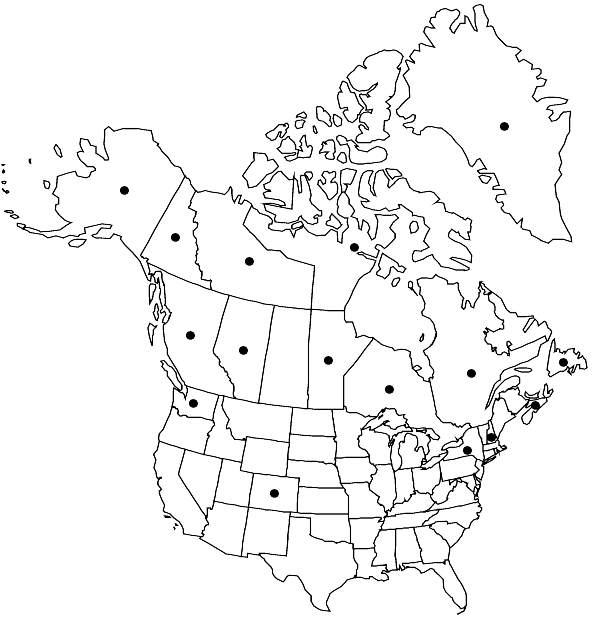Sphagnum lindbergii
Öfvers. Kongl. Vetensk.-Akad. Förh. 14: 126. 1857,.
Plants moderate-sized to large, moderately densely branched; green to brown, often bluish tinged and/or shiny when dry; capitulum flattopped with a conspicuous terminal bud. Stems dark-brown; superficial cortex of 2–4 layers of enlarged, thin-walled cells. Stem-leaves lingulate-spatulate, large, 1.3–1.6 mm; appressed to stem; apex very broad and lacerate; hyaline cells efibrillose and aporose, often septate. Branches strongly 5-ranked and straight. Branch fascicles with 2 spreading and 2 pendent branches, leaves not much elongated at distal end. Branch stems green, with cortex enlarged with retort cells. Branch leaves ovatelanceolate, 1.5–3 mm; straight to slightly subsecund; imbricate to somewhat reflexed and not undulate; margins entire; hyaline cells long and narrow, length to width ca. 10: 1 on convex surface with 1 or more small pores in the cell ends and angles and often with numerous pseudopores along the margins, on concave surface with large round wall-thinnings on the cell ends and angles; chlorophyllous cells triangular to trapezoidal in transverse-section, apex often exposed on concave surface. Sexual condition monoicous or dioicous. Spores 22–34 µm; both surfaces smooth, apparent ridged border on proximal surface; proximal laesura more than 0.5 spore radius.
Habitat: Widespread forming carpets in ombrotrophic to weakly minerotrophic boreal mires
Elevation: low to high elevations
Distribution

Greenland, Alta., B.C., Man., Nfld. and Labr. (Nfld.), N.W.T., N.S., Nunavut, Ont., Que., Yukon, Alaska, Colo., N.H., N.Y., Wash., Eurasia
Discussion
Sporophytes are uncommon. Sphagnum lindbergii is normally easily distinguished from other carpet-forming species of sect. Cuspidata by its large, strongly lacerate stem leaf and dark brown to black stem. Sexual condition is taken from from L. I. Savicz-Lubitzkaya and Z. N. Smirnova (1968).
Selected References
None.
Lower Taxa
"elongated" is not a number.